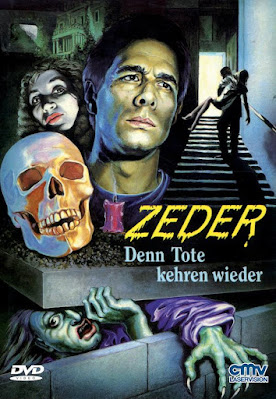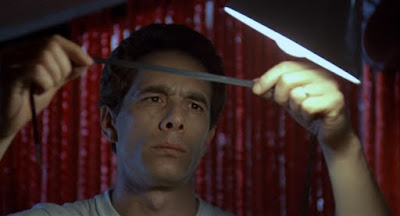Pupi Avati’s Zeder has been an odd enigma of an Italian horror film to me. I’m not really sure what it is trying to do, but its mystique and mismatched place in the genre are part of what make it special. While watching it, I usually wonder what it is we are looking for or what the lead character is so obsessed and serious about, and yet I can't help always feeling drawn in. It’s a movie searching for something deep and menacing, and it does eventually find it, but the journey along the way is a challenging, unsettling, and memorable one with an impressively creepy payoff and a serious lead performance from Deep Red’s (1975) Gabriele Lavia. I also like the way it alludes to a kind of sinister underbelly to the city in a way that is similar to Perfume of the Lady in Black (1974).
Zeder is a fairly restrained horror film with an unrestrained soundtrack (by Riz Ortolani), which results in some strangely histrionic moments. Don’t get me wrong, it is badass, with some dissonant violin string shrieking and heavy bass booms, but when the music abruptly gets loud and scary, sometimes I wonder what’s happening that would command such gravitas to the visual of two characters casually walking along the street catching a taxi or Stefano starting into a sprint just to investigate something vague. Even the start of Stefano’s investigations is triggered by something that would seem like no big deal to most. Stefano’s beautiful wife, Alessandra (Anne Canovas), gifted him a used typewriter for their anniversary. One night while he’s typing, the ink ribbon comes undone, and when he starts unspooling the ribbon, the imprinted macabre words, about barriers of death and something called “K-Zones,” written by the previous owner, catch Stefano’s attention (the way this is filmed and framed makes unspooling an ink ribbon fascinating and alarming). A morbid curiosity results, as he becomes unusually fixated on the writing, retyping it all on to separate sheets of paper.
Stefano later visits a lecturer on occultism at a University, Professor Chesi (John Stacy), to look over his recorded manuscripts. After reading them, Chesi reveals his familiarity of K-Zones which allow the dead to return to life and that they were researched by a Dr. Paolo Zeder (who had himself buried at the house during the intro flashback). Stefano later learns of his typewriter’s original owner, a priest, Don Luigi Costa, with help from a police lieutenant friend, Guido (Alex Partexano). The chase for the elusive and mysterious Don Luigi Costa is essentially the primary goal of Stefano’s investigations, which are met with loads of deception, murder, and conspiracy theories that makes this zombie/giallo/Lovecraftian/Italian horror film a bit incoherent and quite difficult to pin down, but I actually kind of enjoy it for that. In this case, for some reason, not really being able to have a handle on the film makes for an interesting re-watch every time, and I’m usually unsure of what I’ll make of it each time I watch it.
I’ve always loved Gabriele Lavia as the unsettled alcoholic jazz musician from Argento’s Deep Red, especially his drunken conversations with a sober Markus Daily (David Hemmings) (for some reason I had found these parts relatable and almost cathartic). So, I thought it was kind of cool having Lavia as a disturbed lead in Zeder (I consider him to be a part of Italian horror and giallo royalty thanks to roles in films like Beyond the Door (1974), Deep Red, Inferno (1980), and Sleepless (2001)). Here as Stefano he is a bit reminiscent of the traditional giallo protagonist: morbidly fascinated with what is going on but getting in over his head, risking himself and those around him. Stefano is a pretty plain t-shirt and blue jeans all the time kind of guy, but he is still compelling and dead serious about his business. Lavia just has this intense glare that really sells his character's interest and predisposition towards his investigations. Until his obsessive quest takes over, he is good to his wife and does seem to care for her, and Alessandra in turn is supportive of his writing and his investigation and is usually there for him, more so than he probably deserves. This is something he truly realizes towards the end, when grief and desperation take over.
I remember thinking that Zeder was really pushing the Pet Sematary (1983) angle with the ending, only to be surprised later to learn that Pet Sematary, the book, originally came out a few months after Zeder’s original release in Italy (likely a coincidence, but still pretty cool for Zeder).
Zeder is unpredictable and subverts expectations. Like Avati’s Arcane Sorcerer (1996), it does have a few parts that gave me the jitters, and it does get under your skin like Avati’s House with the Laughing Windows (1976). The movie itself almost doesn’t seem to fit in with its Italian horror brethren of the time, which doesn’t matter, because it is still pretty good, despite being a bit slow and iffy at times. It’s different and somehow manages to hit all the marks of a good ‘80s Italian horror film (atmosphere, gore [albeit restrained], a bombastic score, zombies, killers, mystery, subtle gothic horror influences, a faint Lovecraft influence, etc.). For me, it was like nostalgia, familiarity, and novelty all at the same time.
I also appreciate the scientific angle that almost grounds it a little in reality at times so that being presented with the unreal is all the stranger and more shocking (that discovery that Paolo Zeder’s theories were well founded). It ends up being more in line with what the mind would experience discovering horrors in reality. Like the film, these realistic horrors would be difficult to grasp and pin down but also quite hard not to obsess over.
© At the Mansion of Madness














No comments:
Post a Comment